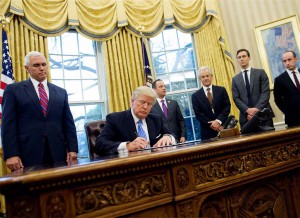
President Donald Trump's rollback of Obama administration CAFE standards was halted by an appellate court.
The U.S. Second Circuit Court of Appeals this week blocked the Trump administration’s efforts delay indefinitely higher penalties for automakers that don’t meet certain fuel efficiency standards.
The rule calling for higher penalties on gas guzzlers was first imposed by the Obama administration and the court’s decision was hailed by environmental groups led by the Natural Resources Defense Council and officials from five states led by California and New York that challenged Trump administration in court.
New York Attorney General Eric T. Schneiderman, one of five attorneys general, who brought the suit at the behest of the environmental groups also lauded the court’s decision, which makes it far less likely the Trump administration can block the added fines.
“The fuel efficiency standards penalty rule is a common sense measure that would protect consumers’ pocketbooks while reducing the carbon emissions that harm our health and drive climate change,” Schneiderman said.
Originally set to take effect in July 2017, the rule increases the penalty imposed on automakers whose vehicle fleets do not meet minimum fuel efficiency standards. The new penalties, which are increased from $5.50 to $14 for every tenth of a mile per gallon a vehicle misses the fuel-economy target is slated to take effect with the 2019 model year, which officially begins October.
(EPA rolling back CAFE in move likely to set up a battle with California. Click Here for the story.)
All federal agencies were required to increase their civil penalty rates by an act of Congress, the 2015 Federal Civil Penalties Inflation Adjustment Act.
In response, the U.S. Department of Transportation issued a new rule to increase the penalty by $8.50 per tenth of a mile per gallon. The Trump administration delayed it, reverting back to the lower penalty rate instead. If the penalty is not sufficiently high, automakers lack a vital incentive to manufacture fuel efficient vehicles, the plaintiffs argued.
“This ruling is a victory for consumers, our economic security, public health and the planet because the Trump administration’s illegal maneuvers to undercut needed fuel economy safeguards was thwarted,” the council said in a statement.
(Click Here for more about automakers being caught up in a showdown between California and DC.)
“The Trump administration should be standing up for the public that overwhelmingly supports strong fuel economy standards and enforcing strong penalties on automakers that fail to meet those standards.”
The updated penalty impels automakers to clean up their fleets, rather than offering them a cheap license to burn more gas if they fail to keep pace with fuel economy targets, the NRDC said.
Environmental groups have noted that fuel economy standards for model years 2012 to 2025 will reduce oil consumption by 3.1 million barrels of oil per day in 2030 and reduces climate-harming greenhouse gas emissions by avoiding production of 570 million metric tons of carbon dioxide — the equivalent of taking 85 million cars off the roads or 140 coal-fired power plants offline.
(Study finds strong support for keeping tougher fuel economy rules. Click Here for the story.)
In the past carmakers such Jaguar Land Rover and Mercedes-Benz, makers of high-end, lend luxury vehicles, have opted to pay fines for missing fuel efficiency targets. With fuel-economy standards set to rise, NHTSA said last summer that many automakers were falling behind current fuel standards and face “the possibility of paying larger CAFE penalties over the next several years.”
